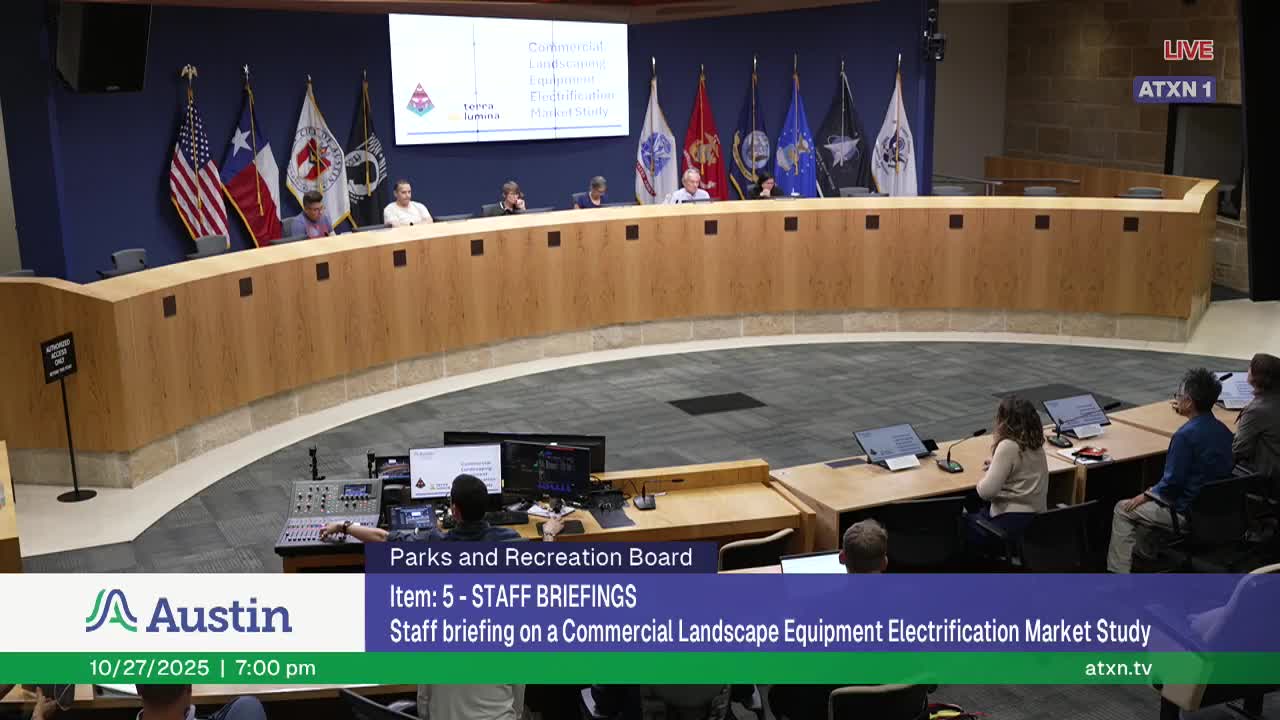Parks staff present commercial landscaping electrification study and 21–24 month pilot plan; residents raise access, cost and soil management concerns
Get AI-powered insights, summaries, and transcripts
Subscribe
Summary
Consultants and Parks staff presented a market study and a phased pilot plan to test battery‑electric commercial landscaping equipment; staff said the city will upgrade the Zilker maintenance barn to provide charging and storage for an initial 21–24 month pilot.
Consultants and Parks staff on Oct. 27 presented the results of a market study and a phased pilot plan to test commercial battery‑electric landscaping equipment in Austin, and the board heard multiple public comments calling for broader review of land‑management practices and equitable access for small businesses.
Consulting team lead Jen Krieger of Terra Lumina Consulting and project partner Leonor Vargas (Wisdom and Familias) summarized a market research effort commissioned by Austin Climate Action and Resilience in partnership with Austin Parks and Recreation. The study surveyed local government and private landscaping operators, conducted interviews and reviewed incentive programs in other jurisdictions. The consultants recommended a “lead by example” approach in which the city pilots electrification in its own fleet while pursuing workforce training, charging infrastructure upgrades and life‑cycle cost analysis before making wide mandates.
Parks staff told the board they received budget funding in the current year to upgrade the Zilker maintenance barn to support charging and safe storage. Staff described a pilot timeline of roughly 21 to 24 months for a departmental pilot that would collect operational data, inform purchasing and test charging and storage protocols. Staff also noted citywide vendor and resource actions: Austin Resource Recovery is developing battery recycling options that Parks could use, with a citywide battery recycling program expected to begin in early 2026.
Consultants said electric handheld tools (trimmers, blowers) show the most immediate promise for light‑duty applications, citing benefits such as quieter operation, lower direct emissions and reduced fuel handling. They also identified higher upfront purchase costs, a need for charging infrastructure upgrades at maintenance facilities and limited battery runtimes for some heavy equipment as present constraints. The report and pilot guide recommend a phased rollout rather than a hard deadline for full electrification.
Board members asked about timeline and equity. Leonor Vargas said Spanish‑language outreach and community interviews showed interest but serious cost concerns among small landscaping contractors; she said smaller firms often cannot afford current commercial electric equipment without incentives. Parks staff confirmed that the initial pilot will apply to city‑owned equipment operated by city staff and that contract language can be used to encourage or require equipment standards for nonprofit or partner operators in the future.
Several speakers during general public comment raised related but broader land‑management concerns. Gail Roady, a volunteer with an Adopt‑a‑Creek Grow Zone group in Zilker Park, urged the board to direct parks, watershed and the Climate Action and Resilience office to review landscaping and mowing practices to reduce soil compaction, improve infiltration, increase carbon sequestration, reduce erosion and mitigate urban heat impacts. Roady said aggressive mowing in some areas has left exposed soil that produced sediment runoff during a recent 1.5‑inch rain event and that electrification alone “is necessary, but not sufficient.”
Other public commenters highlighted community programs and partnerships: Carol Baxter of the Austin Rowing Club described the club’s longstanding partnership with Parks under a city contract since 1988 and youth outreach programs; Paulina Guerrero, a coach with ARC, described school outreach and survivor rowing programs. Mark May, a resident of District 5, urged the board to examine nonprofit partnerships and financial arrangements between the city and organizations that operate events in parks.
The consultants said the full study and a step‑by‑step pilot implementation guide are in the meeting backup; Parks staff said a Spanish translation of the pilot guide would be available by the end of the week. Staff asked the board to note that the pilot will begin at a newly refurbished maintenance facility to avoid investing in facilities planned for decommissioning, but several board members urged that future pilot locations consider equity and access across the city rather than concentrating pilot activity near central‑Austin sites.
